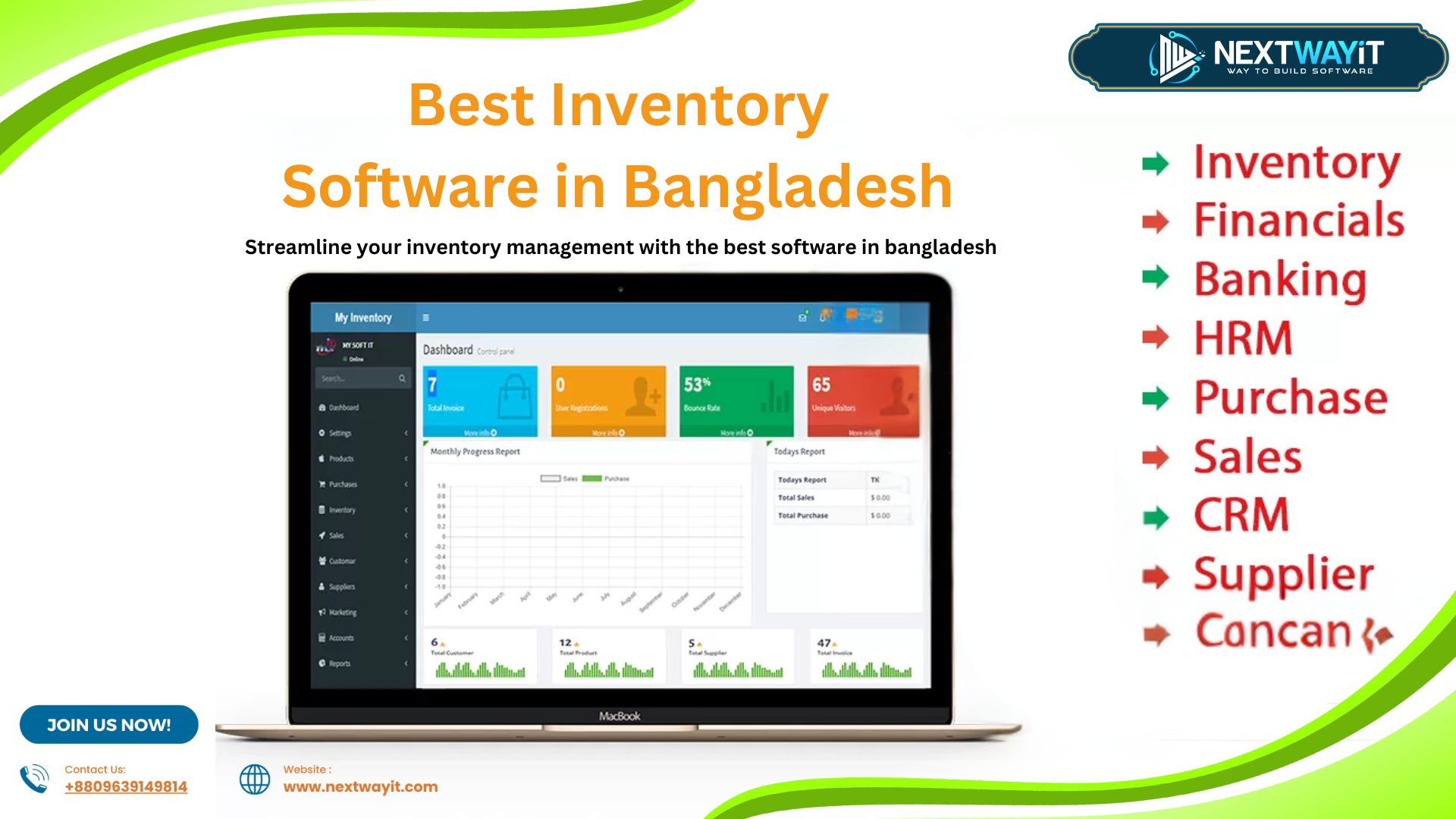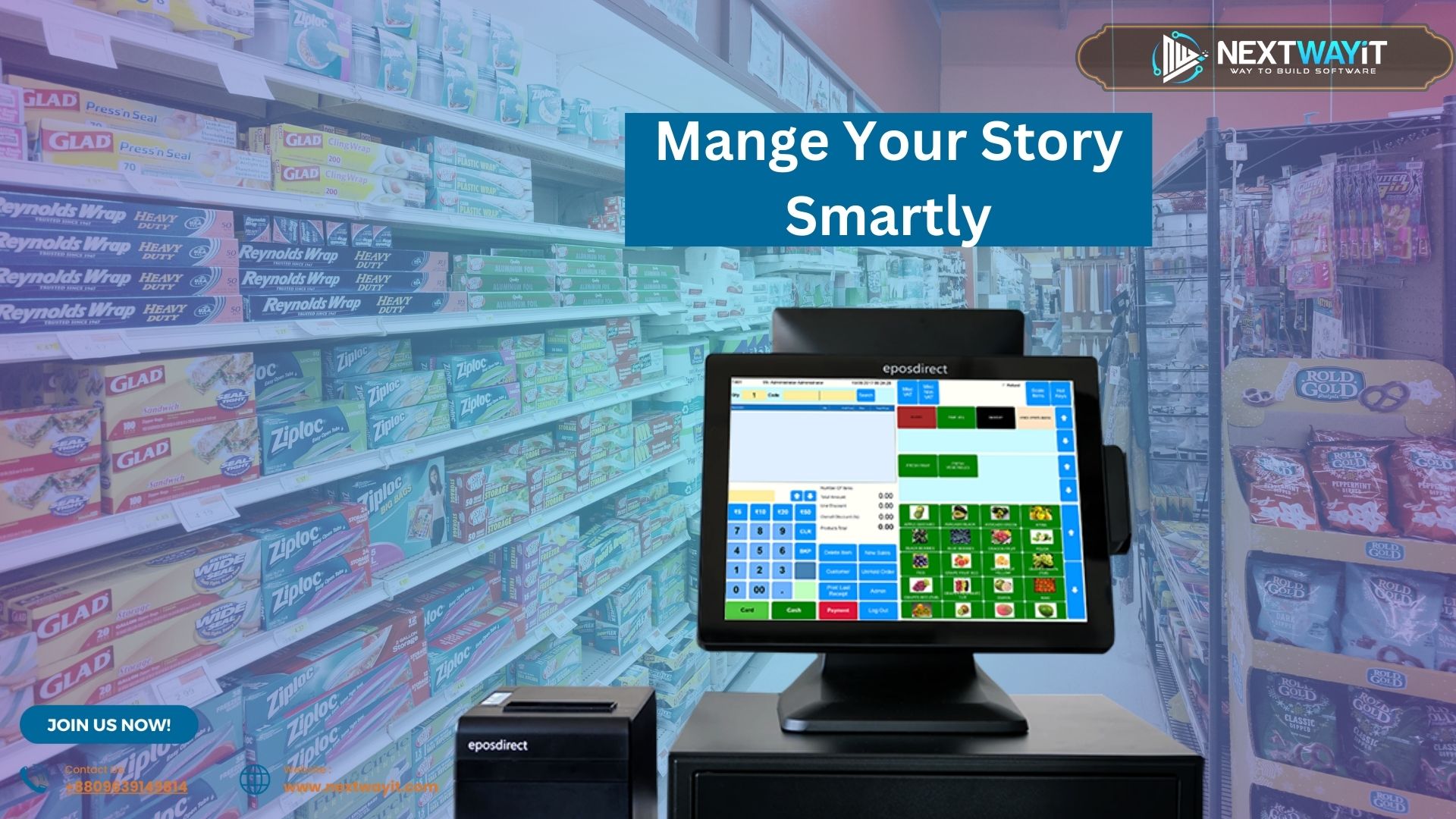
The Importance of Inventory Management Software Solutions in Bangladesh
In this article discuss about Inventory Management Software Solutions in Bangladesh .In the rapidly growing business landscape of Bangladesh, managing inventory efficiently has become a crucial aspect of success. Whether in retail, manufacturing, or distribution, the ability to track, manage, and optimize inventory is fundamental to maintaining a competitive edge. Traditional inventory management methods, which rely on manual processes and spreadsheets, are increasingly inadequate for the complexities of modern supply chains. Inventory management software (IMS) offers a robust solution, providing businesses with tools to streamline operations, reduce costs, and improve customer satisfaction. This article delves into the significance of inventory management software solutions in Bangladesh, exploring their benefits, challenges, and the future trends shaping this sector.
- The Growing Demand for Inventory Management Solutions in Bangladesh
Bangladesh’s economic landscape has seen significant transformation over the past few decades. The country has emerged as a key player in the global textile and garment industry and has seen substantial growth in sectors like retail, pharmaceuticals, and agriculture. This economic boom has led to increased competition among businesses, making efficient inventory management more critical than ever.
In this context, businesses are facing several challenges:
- Complex Supply Chains: As businesses expand, their supply chains become more intricate, involving multiple suppliers, distribution centers, and retail outlets. Managing these complex networks requires sophisticated tools that can provide real-time visibility into inventory levels across all locations.
- Rising Consumer Expectations: With the growth of e-commerce and digital marketplaces, consumers in Bangladesh now expect faster delivery times and a seamless shopping experience. This puts pressure on businesses to maintain accurate inventory levels and fulfill orders promptly.
- Regulatory Compliance: For certain industries, such as pharmaceuticals and food and beverage, strict regulations govern how inventory must be managed and tracked. Non-compliance can result in hefty fines and damage to a company’s reputation.
Given these challenges, the need for efficient inventory management solutions in Bangladesh is clear. Businesses that fail to adopt modern inventory management practices risk falling behind their competitors and missing out on growth opportunities.
- Key Features of Inventory Management Software
Inventory management software is designed to automate and optimize the process of tracking and managing inventory. While features can vary depending on the specific software, the following are some of the most common and essential capabilities:
- Real-Time Inventory Tracking: One of the most critical features of IMS is the ability to monitor inventory levels in real-time. This ensures that businesses always have up-to-date information on stock availability, helping to prevent stockouts or overstocking. Real-time tracking is particularly important for businesses with multiple locations, as it allows for centralized control over inventory.
- Automated Reordering: Many IMS solutions include automated reordering features that trigger purchase orders when inventory levels fall below a predefined threshold. This automation helps ensure that businesses never run out of critical items, while also preventing the costs associated with excess inventory.
- Barcode Scanning and RFID Integration: IMS often includes barcode scanning and RFID (Radio Frequency Identification) integration, which simplifies the process of tracking inventory movements. These technologies can reduce the time and labor involved in manual counting, while also improving accuracy.
- Demand Forecasting: Advanced IMS solutions use historical sales data and predictive analytics to forecast future demand. This helps businesses plan their inventory needs more effectively, reducing the risk of stockouts during peak seasons and minimizing excess stock during slower periods.
- Multi-Location Management: For businesses with multiple warehouses, stores, or distribution centers, IMS can provide visibility and control over inventory across all locations. This feature enables businesses to optimize their inventory distribution and reduce transportation costs.
- Integration with Other Business Systems: IMS can often be integrated with other business systems, such as accounting software, point-of-sale (POS) systems, and enterprise resource planning (ERP) systems. This integration allows for seamless data flow across the organization, improving overall efficiency and accuracy.
- Reporting and Analytics: Detailed reporting and analytics are essential for making informed decisions about inventory management. IMS provides businesses with the data they need to identify trends, assess performance, and make strategic decisions. Reports can include metrics such as inventory turnover, stock aging, and order accuracy.
- Benefits of Implementing Inventory Management Software in Bangladesh
The implementation of inventory management software offers numerous benefits for businesses operating in Bangladesh:
- Cost Savings: One of the most immediate benefits of IMS is the potential for cost savings. By automating tasks like reordering and tracking, businesses can reduce the labor costs associated with manual inventory management. Additionally, better inventory accuracy helps avoid the costs of overstocking and stockouts, leading to more efficient use of capital.
- Improved Operational Efficiency: IMS automates many of the time-consuming tasks associated with inventory management, such as counting stock, generating reports, and placing orders. This automation frees up staff to focus on other areas of the business, such as customer service and sales.
- Enhanced Customer Satisfaction: Accurate inventory management directly impacts customer satisfaction. By ensuring that the right products are always in stock and available for purchase, businesses can fulfill customer orders more quickly and reliably. This leads to higher customer satisfaction and loyalty, which is crucial in a competitive market like Bangladesh.
- Data-Driven Decision Making: IMS provides businesses with access to real-time data and analytics, enabling them to make informed decisions about their inventory. For example, businesses can use this data to identify slow-moving items, optimize stock levels, and plan for seasonal fluctuations in demand.
- Scalability: As businesses in Bangladesh grow, their inventory management needs will evolve. IMS is highly scalable, meaning it can be adapted to accommodate the changing needs of a business. Whether a business is opening new locations, expanding its product range, or entering new markets, IMS can support this growth without requiring a complete overhaul of the inventory management system.
- Challenges in Adopting Inventory Management Software in Bangladesh
While the benefits of inventory management software are clear, there are several challenges that businesses in Bangladesh may face when adopting these solutions:
- Initial Costs: The cost of purchasing and implementing IMS can be a significant barrier for small and medium-sized businesses in Bangladesh. While there are cost-effective solutions available, the initial investment required for software, hardware (such as barcode scanners or RFID readers), and training can be daunting.
- Lack of Technical Expertise: Many businesses in Bangladesh, particularly smaller ones, may lack the technical expertise needed to implement and manage IMS effectively. This can lead to underutilization of the software’s features or improper setup, which can negate the potential benefits of the system.
- Resistance to Change: Change management is a significant challenge when implementing new technology. Employees who are accustomed to traditional inventory management methods may resist adopting new software, particularly if they perceive it as complicated or time-consuming. Overcoming this resistance requires careful planning, clear communication, and ongoing support.
- Infrastructure Limitations: In some areas of Bangladesh, businesses may face infrastructure challenges such as unreliable internet connectivity, which can impact the effectiveness of cloud-based IMS solutions. Additionally, businesses may need to invest in upgrading their existing IT infrastructure to support the new software.
- Overcoming the Challenges
To successfully implement inventory management software, businesses in Bangladesh can adopt several strategies to overcome these challenges:
- Choose the Right Software: It’s important for businesses to select an IMS solution that aligns with their specific needs and budget. There are a variety of options available, from basic inventory tracking tools to comprehensive enterprise solutions. By carefully evaluating their requirements, businesses can find a solution that provides the right balance of features and affordability.
- Invest in Training: Providing comprehensive training for employees is essential to ensure they can effectively use the new software. Training should cover not only the basic functionality of the IMS but also best practices for inventory management. Ongoing support and refresher courses can help maintain proficiency and encourage adoption.
- Phased Implementation: Instead of implementing the entire IMS at once, businesses can take a phased approach, starting with the most critical features and gradually expanding to include additional functionality. This allows employees to become familiar with the software gradually and reduces the risk of disruption to business operations.
- Leverage Vendor Support: Many IMS vendors offer support services to assist with implementation, training, and ongoing maintenance. Businesses should take advantage of these services to ensure a smooth transition and to address any technical issues that arise.
- Success Stories of Inventory Management Software in Bangladesh
Several businesses in Bangladesh have successfully implemented inventory management software, leading to significant improvements in their operations. These success stories highlight the transformative impact that IMS can have on businesses of all sizes:
- Retail Chain in Dhaka: A leading retail chain in Dhaka faced challenges with stockouts and overstocking, which were affecting their profitability and customer satisfaction. After implementing an advanced inventory management solution, the chain saw a 20% reduction in stockouts and a 15% increase in customer satisfaction. The software’s real-time tracking and automated reordering features allowed the chain to maintain optimal inventory levels across all its stores.
- Manufacturing Company in Chittagong: A manufacturing company in Chittagong struggled with high inventory holding costs and inefficient stock management. By adopting a cloud-based inventory management system with demand forecasting capabilities, the company was able to reduce its inventory holding costs by 25% and improve its production planning. The software’s integration with the company’s ERP system also streamlined its supply chain operations, leading to faster order fulfillment and reduced lead times.
- Pharmaceutical Distributor in Sylhet: A pharmaceutical distributor in Sylhet needed to comply with stringent regulatory requirements for tracking and managing its inventory. After implementing an IMS with barcode scanning and reporting features, the distributor was able to achieve full compliance with regulatory standards while also improving inventory accuracy. The system’s reporting tools provided the distributor with detailed insights into stock levels, expiry dates, and order history, enabling better decision-making and reducing the risk of stockouts.
- The Role of Cloud-Based Inventory Management Solutions
Cloud-based inventory management solutions have gained popularity in Bangladesh due to their flexibility, scalability, and cost-effectiveness. These solutions offer several advantages over traditional, on-premises software:
- Accessibility: Cloud-based IMS can be accessed from anywhere with an internet connection, making it ideal for businesses with multiple locations or remote teams. This accessibility allows for real-time monitoring and management of inventory, regardless of where the user is located.
- Scalability: Cloud-based solutions are highly scalable, allowing businesses to easily add or remove features as their needs change. This flexibility is particularly valuable for growing businesses that may need to expand their inventory management capabilities over time.
- Lower Upfront Costs: Unlike on-premises software, which requires a significant upfront investment in hardware and software licenses, cloud-based IMS typically operates on a subscription basis. This reduces the initial costs and allows businesses to pay only for the features they need.
- Automatic Updates: Cloud-based IMS providers handle software updates and maintenance, ensuring that businesses always have access to the latest features and security enhancements without the need for manual intervention.
- Data Security: While some businesses may have concerns about data security in the cloud, reputable cloud-based IMS providers offer robust security measures, including data encryption, regular backups, and disaster recovery plans. This can provide businesses with peace of mind knowing that their inventory data is protected.
- Future Trends in Inventory Management Software in Bangladesh
The future of inventory management in Bangladesh is likely to be shaped by several emerging trends and technologies:
- Artificial Intelligence (AI) and Machine Learning (ML): AI and ML are increasingly being integrated into inventory management software to provide more accurate demand forecasting, optimize stock levels, and automate decision-making processes. These technologies can help businesses predict consumer behavior, identify trends, and respond to changes in demand more effectively.
- Internet of Things (IoT) and RFID Technology: IoT and RFID are revolutionizing inventory management by enabling real-time tracking of inventory throughout the supply chain. These technologies can provide businesses with detailed information about the location, condition, and movement of their inventory, leading to improved accuracy and efficiency.
- Blockchain Technology: Blockchain is being explored as a solution for enhancing transparency and traceability in inventory management. By providing a secure, decentralized ledger of inventory transactions, blockchain can help businesses verify the authenticity of products, track their origins, and prevent fraud.
- Mobile Inventory Management: The rise of mobile technology is enabling businesses to manage their inventory on the go. Mobile IMS solutions allow employees to perform tasks such as scanning barcodes, updating stock levels, and generating reports using smartphones or tablets. This mobility can improve efficiency and enable faster response times.
- Sustainability and Green Inventory Management: As businesses in Bangladesh become more conscious of their environmental impact, there is a growing focus on sustainable inventory management practices. This includes optimizing inventory levels to reduce waste, sourcing products from sustainable suppliers, and using eco-friendly packaging materials.
- Conclusion
In the competitive business environment of Bangladesh, effective inventory management is essential for success. Inventory management software solutions offer businesses the tools they need to streamline operations, reduce costs, and improve customer satisfaction. While there are challenges associated with adopting these solutions, such as initial costs and resistance to change, the long-term benefits far outweigh the drawbacks.
As technology continues to evolve, businesses in Bangladesh must stay ahead of the curve by embracing the latest trends in inventory management. Whether through AI-driven demand forecasting, IoT-enabled real-time tracking, or cloud-based scalability, the future of inventory management holds great promise for businesses that are willing to innovate.
By investing in inventory management software, businesses in Bangladesh can not only enhance their operational efficiency but also position themselves for sustainable growth in an increasingly competitive market.



